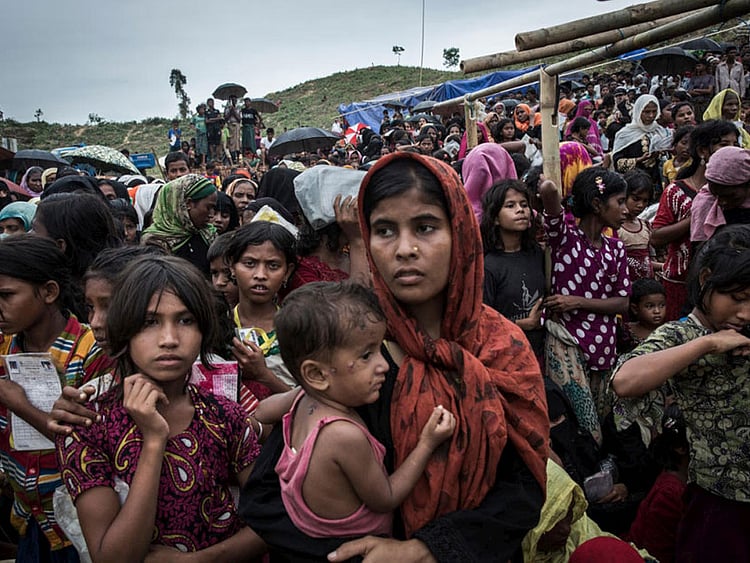UAE raises Dh33 million for Rohingya refugees
Campaign launched by Emirates Red Crescent Society aims to support 1 million

Also In This Package
Abu Dhabi: A nationwide campaign to support Rohingya refugees raised Dh33 million on its first day on Friday, with residents across the country showing their support.
Launched by the Emirates Red Crescent, the humanitarian initiative – From the UAE for Rohingya Children and Women – aims to provide the more than 1 million displaced refugees with food supplies, medical assistance, clean water, education and housing.
According to international statistics, the vast majority of Rohingya refugees are made up of women and children, with at least 660,000 children lacking access to health care services, education, food and water, and over 253,000 women having no access to clean water and sufficient food.
Fahad Abdul Rahman Bin Sultan, deputy secretary general for international aid affairs at the Emirates Red Crescent, in a statement said that all of the aid would be sent by a humanitarian convoy.
“This campaign under the directives of His Highness President Shaikh Khalifa Bin Zayed Al Nahyan is to provide help and support to the Rohingya refugees. More than 20 organisations in the UAE are participating together in this campaign, and in the first day we collected more than Dh33 million.
“We are going to send the aid by a Red Crescent convoy to Bangladesh as many of the refugees are based there, with the humanitarian campaign looking to their needs,” he added.
Meanwhile, Shaikh Hamdan Bin Zayed Al Nahyan, Ruler’s Representative in Al Dhafra Region, and Chairman of the Emirates Red Crescent, ERC, has donated Dh5 million to the campaign.
What is Rohingya crisis?
The Rohingya are an ethnic minority people living in Myanmar (formerly Burma).
An estimated 1 million Rohingya used to live in the county’s Rakhine State. A series of military crackdowns, most intensely between 2016 and 2018, forced most Rohingya to flee to neighbouring Bangladesh.
The number of displaced refugees
Between 2015 and 2017, a series of attacks by Rohingya and reprisals from the military led to, according to the UN, a “systematic” persecution and violence against Rohingya, with scores killed, raped, and tortured. Some 900,000 Rohingya have since fled Myanmar, overwhelmingly to Bangladesh where they live in one of the world’s biggest refugee areas.
Stateless people
Most Rohingya are Muslim while some are Hindu. They are not recognised as citizens of Myanmar. During World War II in Burma (now called Myanmar), Rohingya Muslims had joined forces with the British because they promised them a Muslim country as a reward for fighting against Rakhine Buddhists. The Rakhine Buddhists were allies of the Japanese, who opposed the British. In 1948, Burma denied citizenship to Rohingya after gaining independence, saying they were illegal migrants from Bangladesh. Until the early 1960s, armed Rohingya groups unsuccessfully fought government forces for autonomy or to secede from the country. The 70s and 90s saw a resurgence of Rohingya fighters.
Sign up for the Daily Briefing
Get the latest news and updates straight to your inbox
Network Links
GN StoreDownload our app
© Al Nisr Publishing LLC 2026. All rights reserved.